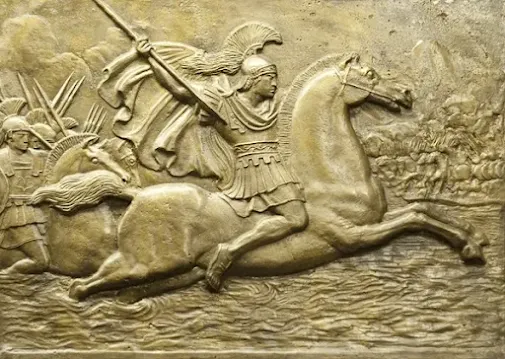Alexander the Great: Conqueror, Visionary, and Cultural Architect:
Personal Traits and Leadership Style:
Alexander's character was a complex amalgamation of ambition, intellect, and occasional ruthlessness. His ability to inspire loyalty among his men was paramount; soldiers followed him across vast distances into battles often against seemingly insurmountable odds. His leadership style was direct and personal—he fought alongside his men, which boosted their morale and loyalty. His charisma and the loyalty he inspired are epitomized in the episode at the Hyphasis River (modern Beas River), where his army, exhausted and fearful of the unknown, pleaded with him not to push further into India. Respectful of his troops’ wishes, he agreed to turn back, demonstrating a rare concession to his own desires for the sake of his men's welfare.
Economic Implications of Alexander’s Conquests:
Alexander’s campaigns had significant economic implications. The vast territories under his rule facilitated the establishment of trade routes that connected the West with the East. This not only increased trade but also the flow of ideas, technology, and cultural practices. His cities, especially Alexandria in Egypt, became economic powerhouses that attracted scholars, artisans, and traders from across the known world.
Moreover, Alexander's introduction of a uniform currency across his empire simplified transactions and integrated diverse economies. This economic unification helped to stabilize and increase wealth, laying the groundwork for economic systems in the later Hellenistic world.
Global Exploration and Cultural Exchanges:
Alexander’s conquests also set the stage for subsequent explorations. His empire reached the edges of the known world, and his reports of the regions of Central Asia and India inspired curiosity and further exploration among later generations of Greeks and Romans. The cultural exchanges initiated under his rule had long-lasting effects on astronomy, mathematics, philosophy, and literature. Scholars in the Hellenistic period built on the knowledge systems of the Persians and Indians, among others.
Philosophical and Artistic Influence:
The spread of Greek culture under Alexander’s rule led to the development of Greco-Buddhist art, which influenced the artistic landscapes of Central Asia and South Asia. Philosophically, the period saw the mingling of Greek philosophical ideas with Eastern thought, leading to new interpretations and philosophies. For example, the influences between Greek and Indian philosophies could be seen in the development of Greco-Buddhism, which integrated Buddhist religious writings with Neoplatonic, Pythagorean, and Stoic theories.
Assessment of His Legacy:
While Alexander the Great is often celebrated for his unparalleled military success and ambitious vision for a united empire, his legacy is also marred by instances of cruelty and the devastation of war. The destruction of Thebes and Tyre, for instance, is a stark reminder of the brutality that often accompanied his campaigns. Additionally, his sudden death left a power vacuum that led to the Wars of the Diadochi (Successors), further fracturing the Eastern Mediterranean and Near East.
In conclusion, Alexander the Great is a quintessential example of a historical figure whose life and actions continue to be analyzed and debated. His ability to combine military might with visionary policies helped to create an empire that, although short-lived, dramatically reshaped the cultural and political landscapes of the ancient world. His legacy of cultural synthesis and exploration set the foundations for the future interactions between East and West, profoundly influencing the course of history.
 |
| Alexander The Great |
